-
 Bitcoin
Bitcoin $84,951.6979
0.08% -
 Ethereum
Ethereum $1,592.4705
-1.50% -
 Tether USDt
Tether USDt $1.0001
0.03% -
 XRP
XRP $2.1031
-1.54% -
 BNB
BNB $583.7595
-0.25% -
 Solana
Solana $128.6618
-1.17% -
 USDC
USDC $0.9999
-0.02% -
 TRON
TRON $0.2548
3.02% -
 Dogecoin
Dogecoin $0.1557
0.07% -
 Cardano
Cardano $0.6133
-1.84% -
 UNUS SED LEO
UNUS SED LEO $9.4090
0.64% -
 Chainlink
Chainlink $12.3914
0.19% -
 Avalanche
Avalanche $19.0828
-2.75% -
 Stellar
Stellar $0.2375
-0.92% -
 Toncoin
Toncoin $2.8958
-2.15% -
 Shiba Inu
Shiba Inu $0.0...01190
0.34% -
 Sui
Sui $2.1128
-2.19% -
 Hedera
Hedera $0.1593
-2.45% -
 Bitcoin Cash
Bitcoin Cash $322.2482
-0.50% -
 Litecoin
Litecoin $75.2246
-1.23% -
 Polkadot
Polkadot $3.5825
-0.77% -
 Dai
Dai $1.0000
0.00% -
 Hyperliquid
Hyperliquid $15.8837
0.99% -
 Bitget Token
Bitget Token $4.3571
1.11% -
 Ethena USDe
Ethena USDe $0.9991
0.00% -
 Pi
Pi $0.6165
-7.44% -
 Monero
Monero $219.5960
1.96% -
 Uniswap
Uniswap $5.1991
-1.57% -
 OKB
OKB $51.7559
0.12% -
 Pepe
Pepe $0.0...07193
-0.33%
How much does cloud service cost for blockchain system development?
Cloud services like AWS, Azure, and GCP are vital for blockchain, with costs varying based on network scale, transaction volume, and data storage needs.
Apr 15, 2025 at 10:57 am
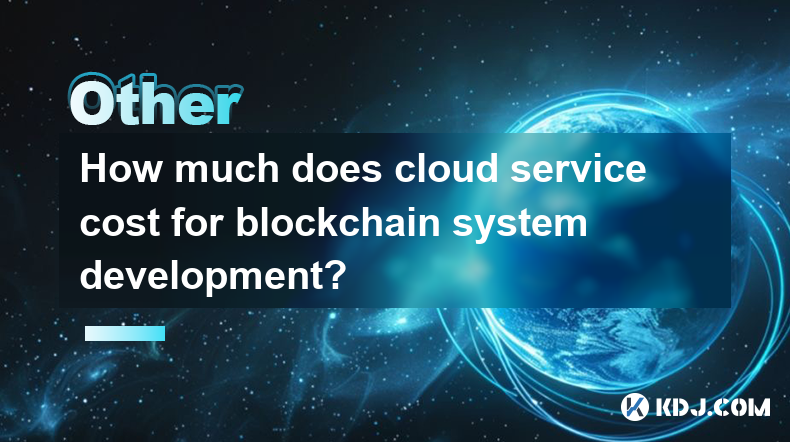
Developing a blockchain system often involves the use of cloud services to host and manage the infrastructure required for running a blockchain network. Understanding the costs associated with these cloud services is crucial for any organization or individual looking to develop a blockchain system. This article will delve into the various aspects of cloud service costs for blockchain development, including different cloud providers, pricing models, and factors that influence overall expenses.
Overview of Cloud Services for Blockchain
Cloud services are essential for blockchain development because they provide the necessary computing power, storage, and network resources to support a blockchain network. Major cloud providers such as Amazon Web Services (AWS), Microsoft Azure, and Google Cloud Platform (GCP) offer specialized services tailored for blockchain applications. These services can range from simple virtual machines to more complex managed blockchain solutions.
Types of Cloud Services Used in Blockchain Development
Blockchain development typically utilizes several types of cloud services, each with its own cost implications. The primary services include:
- Compute Services: These are essential for running nodes and executing smart contracts. Services like AWS EC2, Azure Virtual Machines, and Google Compute Engine are commonly used.
- Storage Services: Blockchain data storage can be managed using services such as AWS S3, Azure Blob Storage, and Google Cloud Storage.
- Network Services: Ensuring secure and fast communication between nodes is crucial. Services like AWS VPC, Azure Virtual Network, and Google Cloud VPC are utilized.
- Managed Blockchain Services: Providers like AWS Managed Blockchain, Azure Blockchain Service, and Google Cloud's Blockchain solutions offer pre-configured blockchain environments that simplify deployment and management.
Pricing Models of Cloud Services
Understanding the pricing models of cloud services is vital for estimating the costs involved in blockchain development. Cloud providers typically offer several pricing models:
- Pay-as-you-go: This model charges based on the actual resources consumed. For instance, AWS EC2 instances are billed by the hour, and data transfer costs are calculated based on the amount of data transferred.
- Reserved Instances: These offer significant discounts for committing to a certain usage level over a period, typically one or three years. This can be beneficial for long-term blockchain projects.
- Spot Instances: These are available at significantly reduced rates but can be interrupted with short notice. They are suitable for non-critical tasks in blockchain development.
Factors Influencing Cloud Service Costs for Blockchain
Several factors influence the overall costs of using cloud services for blockchain development:
- Scale of the Network: The number of nodes and the complexity of the blockchain network directly affect the compute and storage resources required.
- Transaction Volume: Higher transaction volumes require more processing power and storage, increasing costs.
- Data Retention Policies: The amount of historical data stored on the blockchain impacts storage costs.
- Security Requirements: Additional security measures, such as encryption and secure network configurations, can add to the overall cost.
- Geographical Distribution: Deploying nodes across different regions can increase network costs but may be necessary for performance and compliance reasons.
Estimating Costs for Different Blockchain Scenarios
To provide a clearer picture, let's consider cost estimates for different blockchain scenarios using AWS as an example:
Small-Scale Private Blockchain:
- Compute: 2 t3.micro instances (1 master, 1 node) at $0.0104 per hour each.
- Storage: 100 GB of S3 storage at $0.023 per GB per month.
- Network: Minimal data transfer costs.
- Total Monthly Cost: Approximately $15.36 for compute and $2.30 for storage, totaling around $17.66.
Medium-Scale Consortium Blockchain:
- Compute: 5 t3.medium instances (1 master, 4 nodes) at $0.0416 per hour each.
- Storage: 1 TB of S3 storage at $0.023 per GB per month.
- Network: Moderate data transfer costs.
- Total Monthly Cost: Approximately $153.84 for compute and $23 for storage, totaling around $176.84.
Large-Scale Public Blockchain:
- Compute: 20 c5.xlarge instances (1 master, 19 nodes) at $0.192 per hour each.
- Storage: 10 TB of S3 storage at $0.023 per GB per month.
- Network: Significant data transfer costs.
- Total Monthly Cost: Approximately $2,880 for compute and $230 for storage, totaling around $3,110.
Tools for Cost Management and Optimization
To manage and optimize cloud service costs for blockchain development, several tools and strategies can be employed:
- Cost Monitoring Tools: Services like AWS Cost Explorer, Azure Cost Management, and Google Cloud's Cost Management provide detailed insights into resource usage and costs.
- Auto-scaling: Implementing auto-scaling can help adjust resources dynamically based on demand, reducing costs during periods of low activity.
- Resource Tagging: Tagging resources allows for better tracking and allocation of costs to specific projects or departments.
- Cost Allocation Tags: Using cost allocation tags helps in understanding which parts of the blockchain system are driving costs.
Case Studies of Cloud Service Costs in Blockchain Projects
Examining real-world examples can provide valuable insights into the costs associated with cloud services for blockchain development:
Case Study 1: Hyperledger Fabric on AWS:
A company deploying a Hyperledger Fabric network on AWS used 4 t3.large instances for nodes and 100 GB of S3 storage. The monthly cost was approximately $120 for compute and $2.30 for storage, totaling around $122.30.Case Study 2: Ethereum on Azure:
An organization running an Ethereum testnet on Azure utilized 10 Standard_D2s_v3 instances and 1 TB of Blob Storage. The monthly cost was around $432 for compute and $23 for storage, totaling approximately $455.Case Study 3: Corda on Google Cloud:
A financial institution deploying a Corda network on Google Cloud used 6 n1-standard-2 instances and 500 GB of Cloud Storage. The monthly cost was approximately $216 for compute and $11.50 for storage, totaling around $227.50.
Frequently Asked Questions
Q1: Can I reduce cloud service costs by using multiple cloud providers for my blockchain system?
A1: Yes, using multiple cloud providers, a strategy known as multi-cloud, can potentially reduce costs by leveraging the best pricing and services from each provider. However, it requires careful management to ensure compatibility and security across different platforms.
Q2: Are there any open-source alternatives to commercial cloud services for blockchain development?
A2: Yes, there are open-source alternatives such as Kubernetes for orchestration and Ceph for storage. These can be deployed on-premises or on less expensive cloud services, potentially reducing costs. However, they require more technical expertise to set up and maintain.
Q3: How do I estimate the long-term costs of cloud services for a blockchain project?
A3: To estimate long-term costs, consider factors such as expected growth in transaction volume, data storage needs, and potential changes in cloud service pricing. Use cost monitoring tools to track current expenses and project future costs based on historical data and planned expansions.
Q4: What are the hidden costs I should be aware of when using cloud services for blockchain development?
A4: Hidden costs can include data transfer fees, especially for large-scale public blockchains, costs associated with additional security measures, and potential charges for exceeding allocated resources. It's important to review the fine print of service agreements to understand all potential costs.
Disclaimer:info@kdj.com
The information provided is not trading advice. kdj.com does not assume any responsibility for any investments made based on the information provided in this article. Cryptocurrencies are highly volatile and it is highly recommended that you invest with caution after thorough research!
If you believe that the content used on this website infringes your copyright, please contact us immediately (info@kdj.com) and we will delete it promptly.
- Chinese Government Now Faces Even Greater Tariffs from the U.S. as Trade Tensions Continue to Escalate
- 2025-04-16 23:35:14
- Binance Chain Completes 31st Quarterly BNB Token Burn, Eliminating 1.6 Million BNB Tokens
- 2025-04-16 23:35:14
- One of the Most Significant Catalysts for a Cryptocurrency's Growth and Mainstream Adoption Is the Introduction of an Exchange-Traded Fund (ETF)
- 2025-04-16 23:30:13
- As Ethereum (ETH), Cardano (ADA), and Rexas Finance (RXS) show themselves as viable rivals for significant price increases, the cryptocurrency market is heating up.
- 2025-04-16 23:30:13
- Shiba Inu (SHIB) Price Prediction: 7,220% Upside Potential as Experts See Massive Long-Term Growth
- 2025-04-16 23:25:14
- Solana (SOL) is Drawing Significant Attention in the Crypto Market
- 2025-04-16 23:25:14
Related knowledge
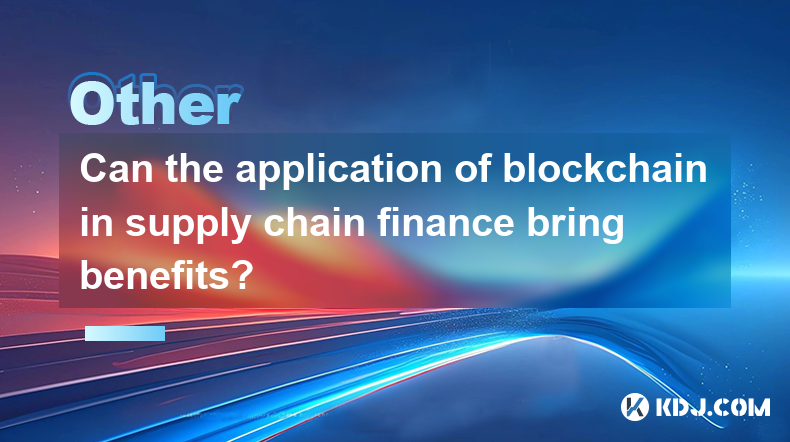
Can the application of blockchain in supply chain finance bring benefits?
Apr 15,2025 at 04:00pm
Can the application of blockchain in supply chain finance bring benefits? The integration of blockchain technology into supply chain finance has garnered significant attention in the cryptocurrency and financial sectors. This article explores how blockchain can potentially revolutionize supply chain finance, detailing its benefits and providing a compre...

Does the ranking of Chinese blockchain apps include cross-chain applications?
Apr 14,2025 at 04:00pm
The ranking of Chinese blockchain apps is a comprehensive evaluation that takes into account various aspects such as user base, transaction volume, and technological innovation. A pertinent question arises regarding whether these rankings include cross-chain applications. Cross-chain applications, which allow different blockchain networks to interact an...
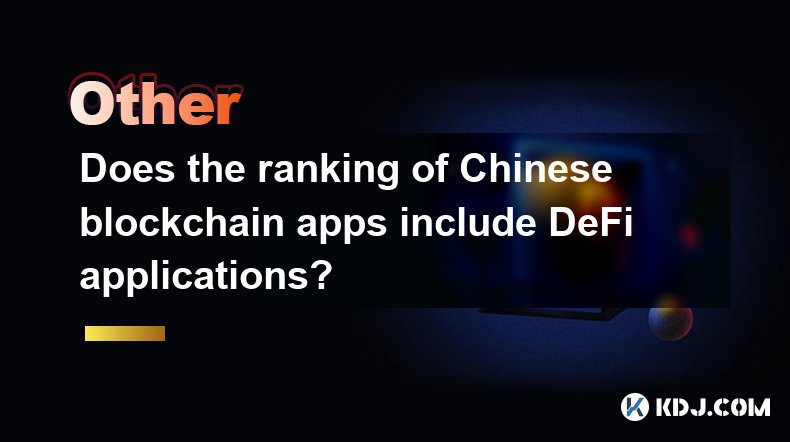
Does the ranking of Chinese blockchain apps include DeFi applications?
Apr 15,2025 at 06:57am
The ranking of Chinese blockchain apps is a comprehensive list that showcases the most popular and influential applications within the cryptocurrency ecosystem. One question that often arises is whether these rankings include DeFi applications. To answer this, we need to delve into the specifics of how these rankings are compiled and what types of appli...
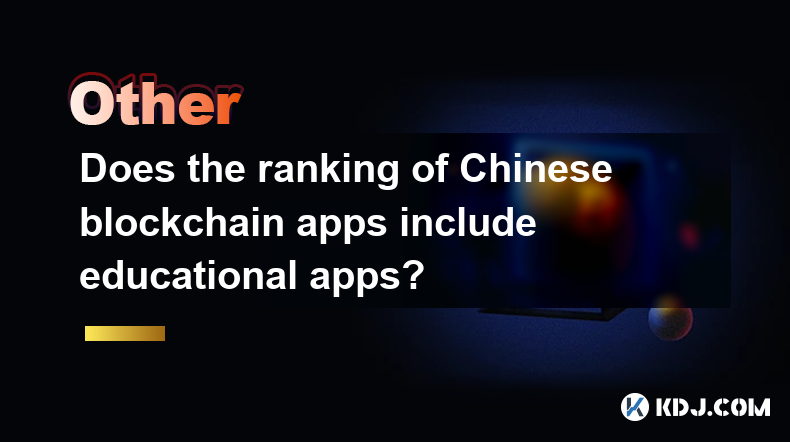
Does the ranking of Chinese blockchain apps include educational apps?
Apr 16,2025 at 03:35am
The ranking of Chinese blockchain apps often includes a variety of categories, from finance and gaming to social networking and beyond. One question that frequently arises is whether these rankings include educational apps. To address this, we need to delve into the specifics of how blockchain apps are categorized and ranked in China, and whether educat...
Does the ranking of Chinese blockchain apps include enterprise-level applications?
Apr 15,2025 at 06:42am
The ranking of Chinese blockchain apps often includes a variety of applications, ranging from consumer-focused to enterprise-level solutions. Understanding the scope and criteria for these rankings is essential to determine if enterprise-level applications are included. This article delves into the specifics of how Chinese blockchain app rankings are co...
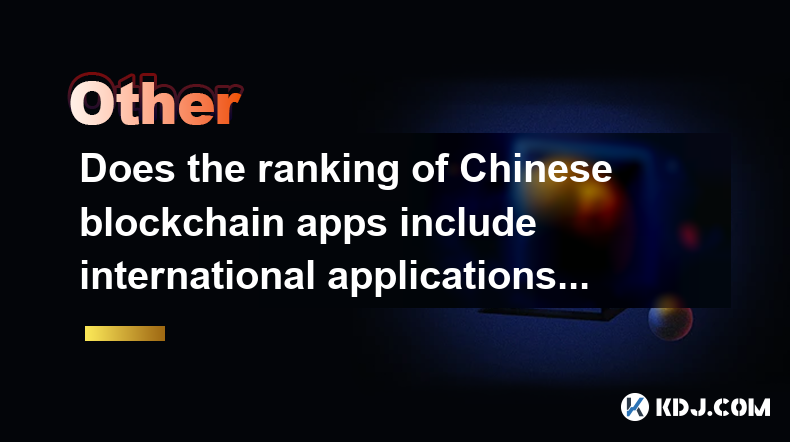
Does the ranking of Chinese blockchain apps include international applications?
Apr 16,2025 at 04:07am
The ranking of Chinese blockchain apps primarily focuses on applications developed and predominantly used within China. However, the question of whether these rankings include international applications is an intriguing one that warrants a detailed exploration. In this article, we will delve into the criteria used for ranking Chinese blockchain apps, th...

Can the application of blockchain in supply chain finance bring benefits?
Apr 15,2025 at 04:00pm
Can the application of blockchain in supply chain finance bring benefits? The integration of blockchain technology into supply chain finance has garnered significant attention in the cryptocurrency and financial sectors. This article explores how blockchain can potentially revolutionize supply chain finance, detailing its benefits and providing a compre...

Does the ranking of Chinese blockchain apps include cross-chain applications?
Apr 14,2025 at 04:00pm
The ranking of Chinese blockchain apps is a comprehensive evaluation that takes into account various aspects such as user base, transaction volume, and technological innovation. A pertinent question arises regarding whether these rankings include cross-chain applications. Cross-chain applications, which allow different blockchain networks to interact an...

Does the ranking of Chinese blockchain apps include DeFi applications?
Apr 15,2025 at 06:57am
The ranking of Chinese blockchain apps is a comprehensive list that showcases the most popular and influential applications within the cryptocurrency ecosystem. One question that often arises is whether these rankings include DeFi applications. To answer this, we need to delve into the specifics of how these rankings are compiled and what types of appli...

Does the ranking of Chinese blockchain apps include educational apps?
Apr 16,2025 at 03:35am
The ranking of Chinese blockchain apps often includes a variety of categories, from finance and gaming to social networking and beyond. One question that frequently arises is whether these rankings include educational apps. To address this, we need to delve into the specifics of how blockchain apps are categorized and ranked in China, and whether educat...

Does the ranking of Chinese blockchain apps include enterprise-level applications?
Apr 15,2025 at 06:42am
The ranking of Chinese blockchain apps often includes a variety of applications, ranging from consumer-focused to enterprise-level solutions. Understanding the scope and criteria for these rankings is essential to determine if enterprise-level applications are included. This article delves into the specifics of how Chinese blockchain app rankings are co...

Does the ranking of Chinese blockchain apps include international applications?
Apr 16,2025 at 04:07am
The ranking of Chinese blockchain apps primarily focuses on applications developed and predominantly used within China. However, the question of whether these rankings include international applications is an intriguing one that warrants a detailed exploration. In this article, we will delve into the criteria used for ranking Chinese blockchain apps, th...
See all articles























































































